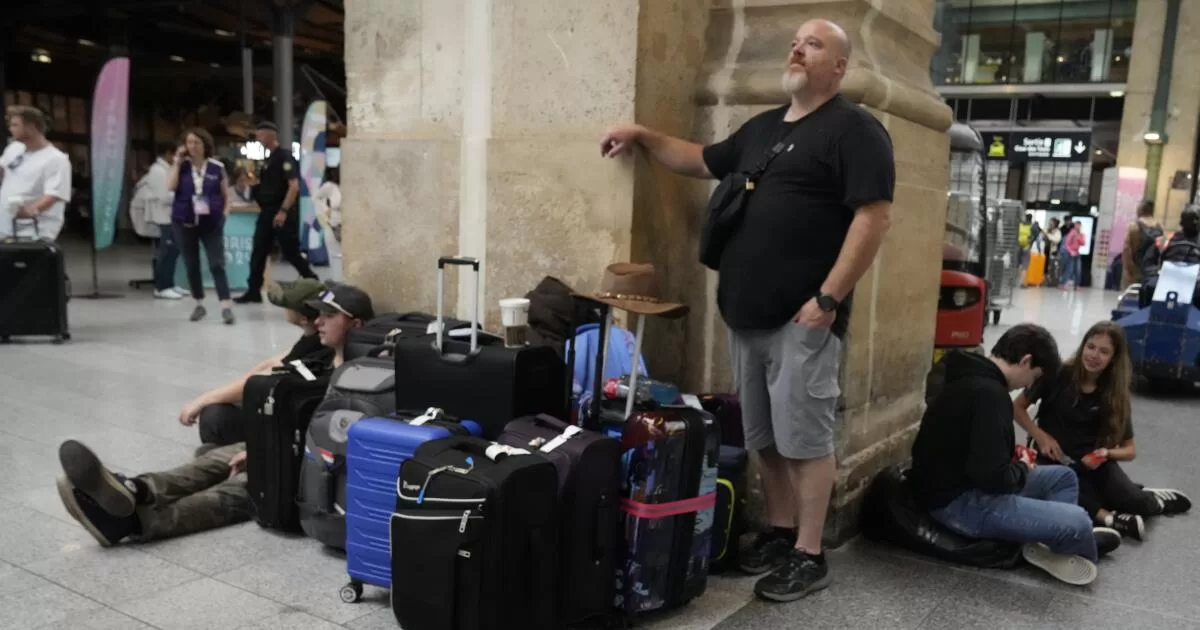France’s high-speed rail network was hit Friday with widespread and “criminal” acts of vandalism including arson attacks, paralyzing travel to Paris from across the rest of France and Europe only hours before the grand opening ceremony of the Olympics.
French officials condemned the attacks as “criminal actions,” though they said there was no sign of a direct link to the Games, and prosecutors in Paris opened a national investigation saying the crimes could carry sentences of 15 to 20 years.
“It’s a hell of a way to start the Olympics,” said Sarah Moseley, a 42-year-old traveler waiting at the Gare du Nord station in Paris as she learned that her train to London was delayed by the rail chaos.
As Paris authorities geared up for a spectacular parade on and along the Seine River, three fires were reported near the tracks on the high-speed lines of Atlantique, Nord and Est, causing disruptions that affected hundreds of thousands of travelers.
Among them were two German athletes in showjumping who were on a train to Paris to take part in the opening ceremony but had to turn back in Belgium because of the closures, and will now miss the ceremony, German news agency dpa reported.
“There was no longer a chance of making it on time,” rider Philipp Weishaupt, who was traveling with teammate Christian Kukuk, told dpa.
There were no known reports of injuries.
French Prime Minister Gabriel Attal said France’s intelligence services have been mobilized to find the perpetrators and of “acts of sabotage” which he described as “prepared and coordinated.”
Attal said that sabotage and arson that hit key parts of France’s high speed rail network on the eve of the Olympics had “a clear objective: blocking the high speed train network.”
He said the vandals strategically targeted the axes from the north, east and west toward Paris hours before the capital hosts the Olympics opening ceremony.
It was “a premeditated, calculated, coordinated attack” that indicates “a desire to seriously harm” the French people, the rail company’s CEO Jean-Pierre Farandou said.
“The places were especially chosen to have the most serious impact, since each fire cut off two lines,” Farandou said.
The incidents paralyzed high-speed lines linking Paris to the rest of France and to neighboring countries, Vergriete said, speaking on BFM television.
The attack occurred against a backdrop of global tensions and heightened security measures as the city prepared for the 2024 Olympic Games. Many travelers were planning to converge on the capital for the opening ceremony, and many vacationers were also in transit.
French authorities have foiled several plots to disrupt the Olympics, including arresting a Russian man on suspicion of planning to destabilize the games.
The Paris police prefecture “concentrated its personnel in Parisian train stations” after the “massive attack” that paralyzed the TGV high-speed network, Laurent Nuñez, the Paris police chief, told France Info television.
Also Friday, the French airport of Basel-Mulhouse on the border with Germany and Switzerland was evacuated in the morning and remained temporarily closed “for safety reasons,” the airport said. It wasn’t clear whether there was a connection to the rail attacks.
The disruptions hit Paris’ Montparnasse station particularly hard.
In the station’s crowded hall, Maiwenn Labbé-Sorin said she spent hours stranded on a train before it doubled back to Paris.
“We stayed two hours without water, without toilets, without electricity,” she said. “Then we could go out on the track for a bit and then the train returned. Now I’m not sure what’s going to happen.”
Many passengers at the Gare du Nord, one of Europe’s busiest train stations, were looking for answers and solutions on Friday morning. All eyes were on the central message boards as most services to northern France, Belgium and the United Kingdom were delayed.
“They should have more information for tourists, especially if it’s a malicious attack,” said Corey Grainger, a 37-year-old Australian sales manager on his way to London, as he rested on his two suitcases in the middle of the station.
Sports Minister Amélie Oudéa-Castera said authorities were working to “evaluate the impact on travelers, athletes, and ensure the transport of all delegations to the competition sites” for the Olympics. Speaking on BFM television, she added, “Playing against the Games is playing against France, against your own camp, against your country.”
SNCF said it did not know when traffic would resume and feared that disruptions would continue “at least all weekend.” SNCF teams “were already on site to carry out diagnostics and begin repairs,” but the “situation should last at least all weekend while the repairs are carried out,” the operator said. SNCF advised “all passengers to postpone their journey and not to go to the station,” specifying in its press release that all tickets were exchangeable and refundable.
Valerie Pecresse, president of the regional council of the greater Paris region, speaking from Montparnasse station, said “250,000 travelers will be affected today on all these lines.” Substitution plans were underway, but Pecresse advised travelers “not to go to stations.”
The troubles comes ahead of an opening ceremony has been planned for later Friday, in which 7,000 Olympic athletes are due to sail down the Seine past iconic Parisian monuments such as Notre-Dame Cathedral, the Louvre Museum, and the Musee d’Orsay.
Thomas Adamson and Jeffrey Schaeffer report for the Associated Press. Associated Press writers Tom Nouvian in Paris, Angela Charlton in Paris, James Jordan and Danica Kirka in London and Samuel Petrequin in Brussels contributed.
